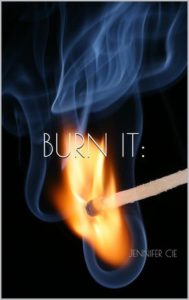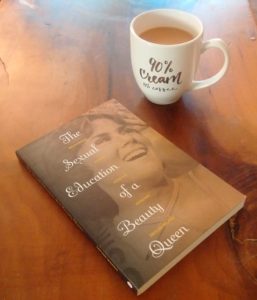 I’ve had Burn It on my TBR for three years. I received it as a review request from the author, Jennifer Cie, but it never appealed to me. So, it languished. I randomly came across it on my kindle, this afternoon, and decided to give it a read.
I’ve had Burn It on my TBR for three years. I received it as a review request from the author, Jennifer Cie, but it never appealed to me. So, it languished. I randomly came across it on my kindle, this afternoon, and decided to give it a read.
Description from Goodreads:
With the rest of her life ahead of her, Jennifer Cie is taking a step back. As she reflects on what was once next, Jennifer dives into the past, finding mortality in no longer remembering how magical the world felt as a child, apologizing for the moment she realized she could not be her Prince Charming’s Cinderella, and lamenting the idea that in death people forget “there doesn’t have to be a dead body in the room”. A collection of “what I wish someone would’ve told me” narratives exploring youth, love, and death, the reader is taken on a riveting ride through Jennifer Cie’s past as she accepts the present.
Review:
Arg, reviewing memoirs of living people is hard. Reviewing living peoples’ memoirs that deal with their hurts and traumas is even harder. Because, in a very real sense, there is no way to separate the writing from the events. Oh sure, the author doesn’t have a firm grasp of formatting or needs to invest in far better editing is possible, but the writing of the story is irrevocably linked to the unchangeable events of their lives and criticizing one is critiquing the other. So, rather than try, I’m going to set down here a series of impressions I had while reading the book.
- Near the end of chapter one: This is the angst filled war cry of the Millennials—the 20-somethings fucked over by the baby boomers, fed a steady diet of ‘you can be anything you want to be,’ along side ‘you’re obviously too lazy to be successful, as you’ve not succeeded in this zero growth, zero opportunity, zero prosperity market that we’ve endowed you with.’ And it’s good. It’s emotive and moving, unfortunately it’s also pointless. It’s stream of consciousness, vignette rambling that never accomplishes anything, that never manages, despite it’s obvious intelligence and poetry, to cumulate into anything meaningful. And while I gather that’s sort of the point; it’s the perfect allegory for the position young adults find themselves in—the stranded, abandoned, farce of accountability—it’s frustrating to read. You start with such high expectations, are led along a pleasant, padded journey, to arrive nowhere.
- Early in chapter two: Oh, now we’ve hit the clichéd angst filled, ‘OMG love is so all-encompassingly horrible-wonderful.’ We all remember our early twenties being full of this same chaos of emotions.
- Tears. Not only for the things the author goes through, but for all the girls on college campuses everywhere going through the same thing. A huge emotional impact. I hope it was cathartic to write it and release it into the world.
- That’s a great wedding speech.
- Oh shit. Like one life shattering trauma wasn’t enough. Someone hug this girl…well, maybe she’s not the huggy time. But someone do what needs doing to comfort her. I demand it. Shelfish yes, but I demand it.
- This would be great for people in their early twenties to read. I’m almost forty and I can remember relating to some of it. But I’m too far removed for anything but the tragedies to truly move me. The rest, while relevant and real, feels over blown and dramatic. We all had to suffer through those same uncertainties, that lack of solid identity, that confusion and self doubt. That’s what growing up means. It’s not special or specific to anyone. But to those still mired in it, seeing another experiencing it could be really important. Or, might be their ‘this is what happens next’ moment.
- I really wish it wasn’t quite so poetry-journal in its format (including all the typos, missing words and homophones you would expect in a diary one keeps for themselves). It’s confusing and lacks any significant sense of purpose. The prose is great, but I need more structure.
- If I had a paper copy I just might burn it, as requested.
So, maybe not really a review, but there you have it. These are the main thoughts that jumped out at me while reading Burn it. Pass it out to female college Freshman.

 I won a copy of
I won a copy of